EUROPARC participates in a Council of Europe consultation on the Climate Crisis and Young People
EUROPARC is active in the Council of Europe in the fields of nature protection, climate change, human well-being and young people.
EUROPARC participates in a Council of Europe Consultation on the Climate Crisis and Young People
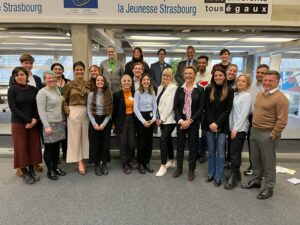
The youth consultation involved young climate activists, youth-led NGO representatives, academia and government representatives
The Council of Europe (CoE) is an International Organisation, which gathers almost all European Countries to promote Democracy, Human Rights, and the Rule of Law. The foreign ministers of all countries meet here to decide on recommendations, which are not legally binding, but they are encouraged to implement these nationally and they are reviewed every 5 years. EUROPARC’s Youth Officer, Jessica Micklem-Kolenic, was invited to participate in a consultative meeting for a recommentation on the 22 – 25 February 2023 in Strasbourg. This recommendation was on the Climate Crisis and Young People and was initiated by young people through the European Youth Department.
Meaningful Youth Participation in the Council of Europe
For over 50 years, the Council of Europe has been leading by example on praticing meaningful youth inclusion. All policies that are about young people, are co-drafted by youth and additionally, young experts are consulted for recommendations concerning them. This work is led by the Joint Council on Youth, which is a decision-making body with half the members from organised youth organisations such as European-wide youth-led NGOs, national youth committees and federations of youth political parties (Advisory Council on Youth or CCJ). The other half of this Joint Council are representatives from governments, specifically the ministries working on young people (European Steering Committee for Youth or CDEJ).
A Council of Europe Recommendation
The Youth Department organised an expert non-formal trainer, Anuschka Ruge, who facilitated the consultation for the recommendation on the Climate Crisis and Young People. Below you can see a visual she created to showcase the roadmap from the initiation phase to the implementation. Once an idea for a recommendation has been presented, approved and the drafting group has been set up, they have the choice to either research the issue to come up with the content and priorities, or to do a consultative meeting. For work with young people, consultative meetings are more worthwhile as the experiences of the youth change rapidly over time and are not often formalised into publications. For this consultation, the attendees were 20 youth climate activists, and representatives from youth organisations, committees and youth political groups, as well as a few academics and goverment representatives.
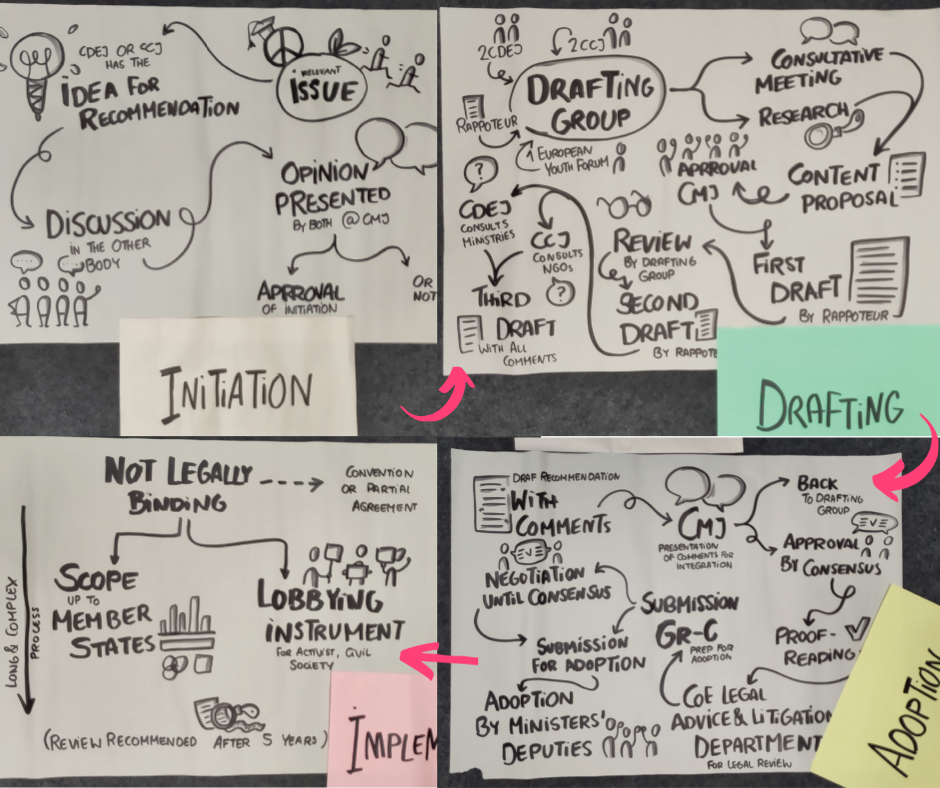
The process for a Council of Europe recommendation
All of this information was shared with the participants of the consultations within the first few hours, setting the scene for the work happening in the background of the Council of Europe. One of the strongest possible legal tools to combat climate change and biodiversity loss is the implementation of the Human Right to a clean, healthy and sustainable environment within the structure of the European Court of Human Rights. Representatives from this Court and the Council of Europe Steering Committee on Human Rights presented their work on the progress os this legal instrument. This information can be found in a previous EUROPARC news article.
The goal of the consultation, was to share experiences and perspectives as well as to prioritize about five points, which could be focused on in the recommendation. While many young people stressed tackling the root causes of the climate crisis, namely the unequal global economic system, the overuse of resources, and valuing economic growth above all else, the recommendations could only be within the mandate of the Council of Europe, namely concerning issues related to Democracy, Human Rights and the Rule of Law, not the economic system.
The Consultation with Young People
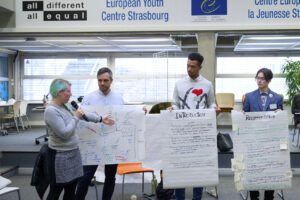
Sharing our ideas after two days of brainstorming
The first task was to dive into the four key priorities of the Youth Sector Strategy for 2023 and share challenges, barriers and opportunities:
- Revitalising a pluralistic democracy
- Access to rights
- Living together in peaceful and inclusive societies
- Youth work
Thereafter the participants ran through a series of brainstorming exercises from which they grouped together concepts and identified priorities. Some of the key points mentioned were:
- Accessible youth participation: including the voices of minorities and disadvantaged groups in democratic spaces
- How do we incentivise climate action: supporting the work on a Human Right to a clean, healthy and sustainable environment as well as changing the measures of success in our economies
- Addressing systemic drivers: implementing a youth-test for policies at all levels of governance to see their impact on young people now and in the future.
- Strengthening the link between climate justice and social justice: acknowledging that we need a socio-ecological transition and discarding language that polarises social issues and environmental issues (especially in funding proposals and budgets).
- Enforcement of previous agreements: respecting the rights of Indigenous Peoples, creating safeguards for environmental Human Rights defenders
- Just Transition: providing more incentives for green jobs in nature protection and climate action
The workshop culminated in a presentation of possible recommendations for the Secretary General of the Council of Europe, Marija Pejčinović Burić, and the Icelandic Foreign Affair Minister, Thórdís Kolbrún Reykfjörd Gylfadótti.
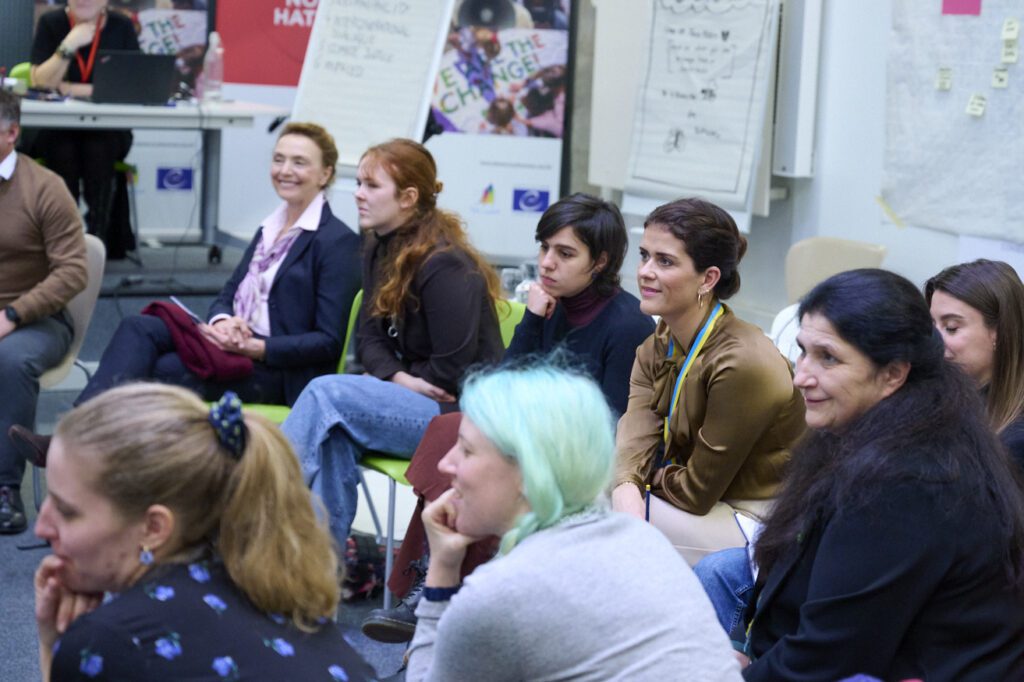
Sharing our ideas with the Icelandic Foreign Affairs minister as the current presidency of the Council of Europe
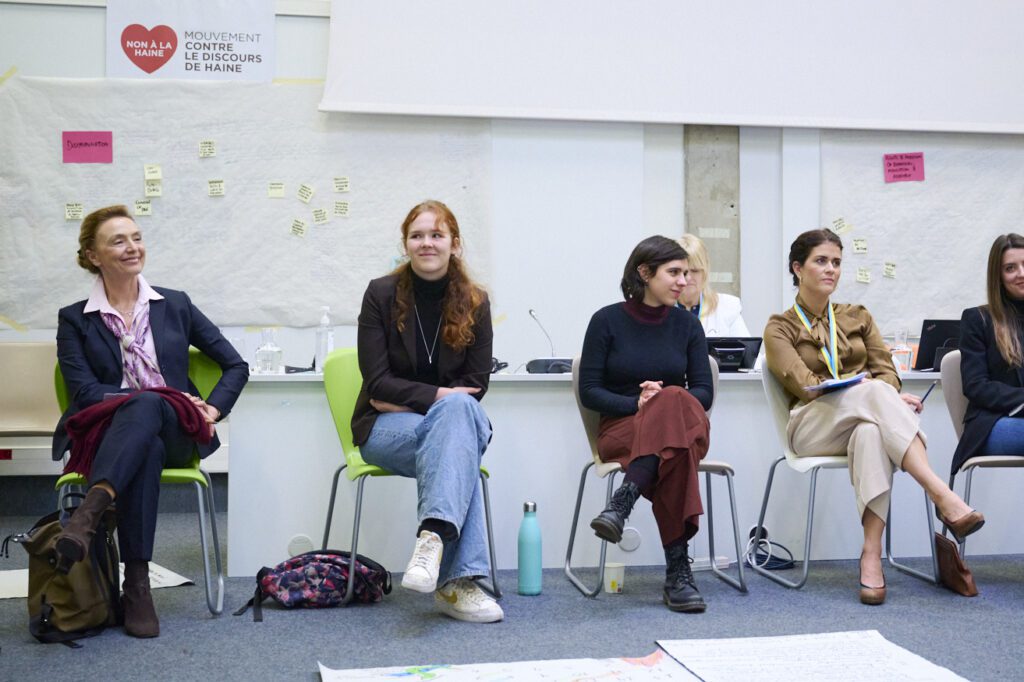
Meeting with the Secretary General (left) of the Council of Europe